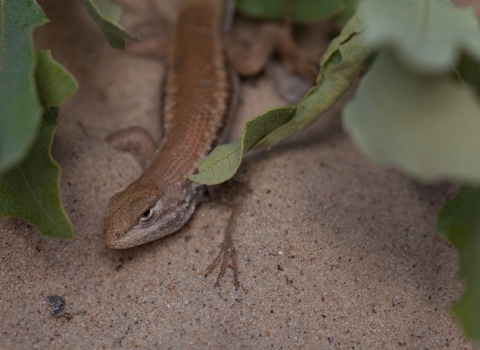The U.S. Fish and Wildlife Service and the U.S. Coast Guard are working with the Louisiana Oil Spill Coordinator Office, Texas Petroleum Investment Company and Forefront Emergency Management to mitigate an estimated 50-barrel crude oil release on Delta National Wildlife Refuge.
A silver sheen was observed by an aerial overflight on May 28, 2014. Texas Petroleum Investment Company (identified as the responsible party), and Forefront Emergency Management responded to conduct an initial assessment, though inclement weather prevented a full response.
On May 29, 2014, the U.S. Fish and Wildlife Service, Coast Guard, Texas Petroleum Investment Company, and Forefront Emergency Management formed a Unified Command. Clean-up crews gathered to evaluate the site and determine the best response to mitigate effects of this spill.
They determined the source of the discharge was from a breach in a bulk line buried below the surface of the marsh. The breach has been repaired and the line was pressure tested. The line was flushed with fresh water to remove any remaining oil and will not be used for future production.
The impacted area is located about 10 miles southeast of Venice, in Plaquemines Parish, Louisiana. About 10 acres of fresh water marsh in a remote section of the refuge have been impacted by the release. Access into the area is difficult and is limited to flat-bottomed vessels.
The U.S. Fish and Wildlife Service concurs with the Unified Command and supports an in-situ burn to remove the contaminated oil. In-situ burning is a response technique that involves the controlled burning of oil at the spill site. The controlled burn is expected to significantly reduce the amount of oil in the marsh, accelerate clean-up operations, and minimize the effect of both oil and habitat impacts to the marsh.
The in-situ burn is scheduled to be conducted on Tuesday June 3, 2014. Octave pass will be temporarily closed to mariners and will be reopened as soon as the burn is concluded. The burn will be strictly controlled and closely monitored by safety personnel to minimize environmental impact. To ensure the safety of the public, further safety precautions will be implemented, including comprehensive air monitoring and monitoring changes in wind direction.
Airboats and scare cannons are serving as the primary tools for hazing wildlife during clean-up operations. The controlled burn is not expected to have any impacts on avian, resident wildlife or marine species.
There will be additional clean-up operations after the burn to continue to remove contamination and allow the marsh to recover.
For more information contact Refuge Manager Neil Lalonde at 985-882-2026 or neil_lalonde@fws.gov.
Press Release
U.S. Fish and Wildlife Service, Coast Guard, and Responsible Party Responds to 50-Barrel Oil Spill on Delta National Wildlife Refuge with Controlled Burn


